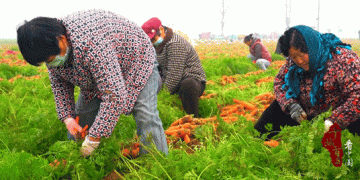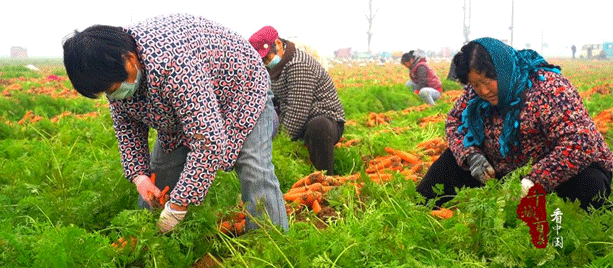A Bumper Harvest in Shandong
In the fields of Mudan District, Heze City, Shandong Province, vibrant orange carrots are being harvested in abundance. Large, plump, and vividly colored, the carrots signal a successful season. Harvesting machines move steadily across the fields while workers sort and collect the produce, creating a lively harvest scene.
This success is no accident. Mudan District has leveraged its natural geographical advantages to develop carrots as a specialty crop. Through targeted strategies, the region has built a modern agricultural system that integrates planting, processing, and sales.
Modernization in Action
Carrot farming in Mudan District has undergone significant transformation, focusing on three key pillars:
- Standardization: The implementation of rigorous farming standards ensures consistent quality across large-scale production.
- Mechanization: Machines for planting, harvesting, and sorting have significantly reduced labor requirements while improving efficiency.
- Smart Agriculture: Technology, including precision irrigation and real-time monitoring, has optimized crop growth and resource usage.
This comprehensive approach has enhanced productivity and ensured that the carrots meet international quality standards, making them attractive to both domestic and foreign markets.
An Industry on the Rise
The carrot industry in Mudan District has grown beyond cultivation to include processing and distribution, forming a complete value chain. The local government and producers have collaborated to expand market access, enabling carrots from this region to reach international markets. Today, Mudan carrots are exported to countries across Asia and Europe, bolstered by their reputation for quality and flavor.
Data from recent years shows a steady increase in carrot exports from Shandong Province. In 2022, Shandong accounted for over 40% of China’s carrot exports, with Mudan District contributing significantly to this figure.
Lessons for Modern Agriculture
The success of Mudan District highlights the importance of integrating modern techniques into traditional farming:
- Investment in Technology: Mechanization and smart solutions enhance efficiency and resilience.
- Building Market Linkages: A focus on quality and consistency opens doors to global trade.
- Local Adaptation: Tailoring crops to regional conditions maximizes productivity and minimizes risks.
Shandong’s Mudan District offers a compelling example of how modernization can elevate agricultural practices, turning a humble vegetable into a global commodity. By embracing technology, standardization, and market-driven strategies, the district has secured its place as a leader in carrot production. For farmers and agricultural professionals worldwide, this story underscores the potential of innovation in ensuring both productivity and profitability.































